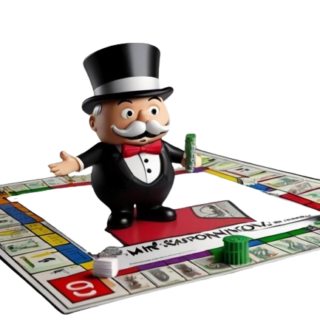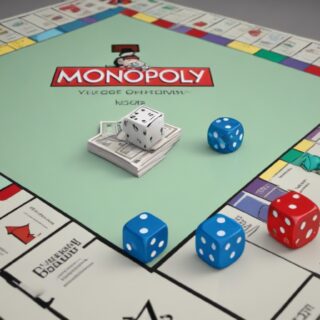Mastering Monopoly: A Guide to the Game’s Rules
Monopoly is a classic board game that has been enjoyed by families and friends for decades. It’s a game of strategy, negotiation, and luck that can be both fun and challenging. If you’re new to the game or just need a refresher, here’s a guide to the rules of Monopoly:
Object of the Game
The goal of Monopoly is to become the wealthiest player by buying, renting, and selling properties.
Setup
- Place the game board on a flat surface.
- Each player chooses a token and places it on the “GO” space.
- Each player is given a set amount of money (usually $1500).
- Determine the starting player (often done by rolling the dice).

Gameplay
- Starting with the designated player, players take turns in clockwise order.
- On your turn, roll the dice and move your token clockwise the number of spaces indicated.
- Follow the instructions on the space you land on:
- If you land on an unowned property, you can buy it from the bank at the price listed.
- If you land on a property owned by another player, you must pay rent.
- If you land on a Chance or Community Chest space, draw the top card and follow its instructions.
- Players can buy properties, build houses and hotels, and collect rent from opponents.
- Players can trade properties with each other.
- If a player lands on an unowned property and chooses not to buy it, it goes to auction.
- Jail: If a player lands on the “Go to Jail” space, draws a “Go to Jail” card, or rolls doubles three times in a row, they go to jail.
- To get out of jail, a player must pay a fine, use a “Get Out of Jail Free” card, or roll doubles.
- Bankruptcy: If a player cannot afford to pay rent, buy a property, or pay a fine, they are bankrupt and out of the game.
- The game continues until only one player remains.
Winning the Game
The last player remaining in the game, who has not gone bankrupt, is the winner.
Optional Rules and Variations
- Speed Die: A third die can be added to speed up the game.
- House Rules: Players can agree to certain house rules, such as free parking money, different starting money amounts, or different auction rules.
Conclusion
Understanding and following these rules will ensure an enjoyable and fair game of Monopoly for all players. So gather your friends and family, roll the dice, and see who can become the wealthiest tycoon in this classic game of property and strategy!
What comes with the game
Here’s a table outlining the components included in a standard Monopoly game:
| Component | Description |
|---|---|
| Game Board | The board consists of 40 spaces representing properties, railroads, utilities, and special spaces like Chance and Community Chest. Players move around the board buying properties and collecting rent. |
| Tokens | Tokens represent players on the board and include classic items like the thimble, top hat, and car. Players choose a token at the beginning of the game. |
| Money | Monopoly money comes in different denominations and is used to buy properties, pay rent, and manage finances throughout the game. |
| Property Deeds | Deeds represent ownership of properties and include information such as purchase price, rent cost, and building costs. Players collect deeds when they buy properties. |
| Houses and Hotels | Players can purchase houses and hotels to increase rent on their properties. Houses are placed on properties to indicate rent increases, and hotels replace houses for higher rent. |
| Chance and Community Chest | These cards are drawn when a player lands on the corresponding space. They contain instructions that can be beneficial or detrimental to the player, such as paying or receiving money, or moving to a different space on the board. |
| Dice | Monopoly uses two six-sided dice for movement around the board. Players roll the dice to determine how many spaces to move on their turn. |
| Banker’s Tray | The banker manages the game’s money and properties. The banker’s tray includes compartments for the different denominations of money and property deeds. |
| Rules | The rulebook outlines how to play the game, including setup, gameplay, and winning conditions. It also includes information on optional rules and variations. |
| Mortgaged Property Cards | When a property is mortgaged, a card is placed on the property to indicate that it cannot collect rent until the mortgage is paid off. Players can mortgage properties to raise funds. |
| Houses and Hotels Tokens | These tokens are used to represent houses and hotels when purchased by players. They are placed on properties to indicate the level of development and the increased rent value. |
Ready to roll the dice and take on the challenge of becoming the ultimate property tycoon?
Set up the board, and let the wheeling and dealing begin!
Time to buy, sell, and trade your way to victory in the timeless game of Monopoly.
Who will build the biggest empire and bankrupt their opponents? Find out now by starting your Monopoly adventure


